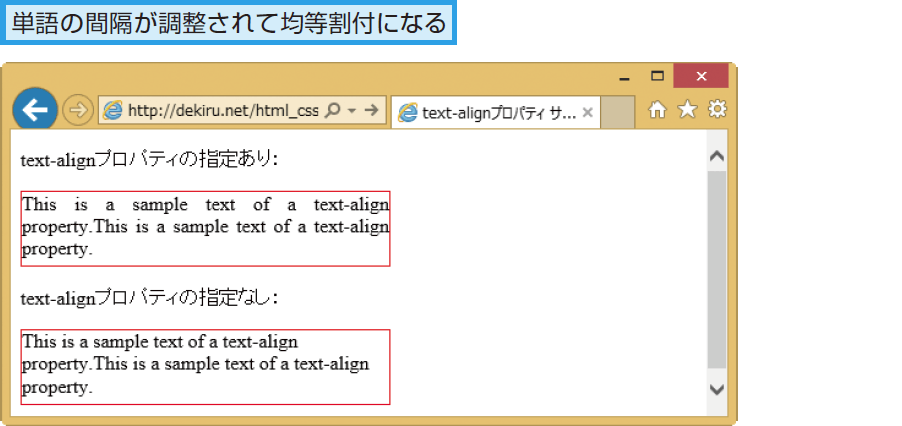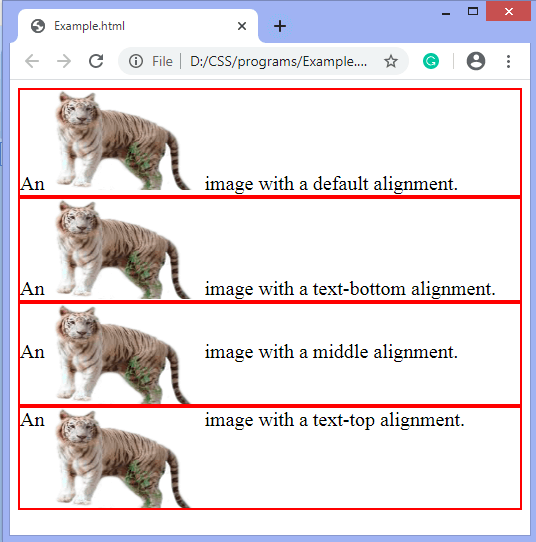

We don’t really use this option with our websites and try to keep images and text spaced out above and below each other. That is how you get a pic and text to be on the same line in the article. Get the image where you want it then highlight the text around it so you can align to the opposite side. When you select your image you can select to align left, center, or right and also the image size.

That is why you may need to get in there and play around for a bit to get used to it. How Do I Align Text And Images In WordPress?Īligning texts and images together in WordPress can cause some havoc until you get used to doing it. Save the post and view it live or in preview mode.
Justify text css code#
Justify text css how to#
Related Questions How To Justify Tex In Gutenberg?
Justify text css update#
Once done, hit update and preview the page/post and you should see the text under the specified block has been formatted to justify. Now, go inside the editor and select the block where you want to apply the new justify-text CSS class, then go to the Documents tab in the right side menu, click on Advanced and enter justify-text as the additional CSS class. Hit the Publish button, and the code will be saved with your WordPress theme. Now, inside the provided field enter the following code snippet: Note : This guide involves some coding and is recommended for intermediate level users.Įnter your WordPress Dashboard > Appearance > Customize > Additional CSS.

How To Justify Text Without Installing Extra Plugins? Since WordPress 5.1 replaces the Classic Editor with the Gutenberg Editor, we had to reinstall it again using the plugin.Īlso, as mentioned earlier, since WordPress v4.7, WordPress dropped support for the justify text option from their post/page editor, which is why we need the other plugin. For this tutorial we will be changing the text alignment of the Sample Page.Īs you can see, we are now using the Classic WordPress Editor and the Justify Text button has been restored. Navigate to the the post or page where you want to change text alignment to justify. Pick the Classic Editor as the default editor for all users it replace the Gutenberg editor. The Classic Editor plugin has added two new options as shown in the image above. Once both plugins are installed, navigate to WordPress Dashboard > Settings > Writing.
Justify text css install#
Press Install and Activate, then move onto the next step. However, for the purpose of this tutorial, we will be using Re-Add Text Justify Button. Now type in Justify Text in the search field.Īs you can see, there are plenty of plugins to help you justify text in WordPress. Now navigate back to the Add New Plugins interface. This will take you to the Installed Plugins screen. Hit Install followed by Activate to incorporate the Classic Editor into your WordPress website.

Type in Classic Editor in the search field and you should see the following plugin. Head on over to your WordPress Dashboard > Plugins > Add New. An In-Depth Guide On How To Justify Text in WordPress Here we have covered a step-by-step comprehensive guide to help you justify text in WordPress. Now, in case you are completely new to WordPress with little experience on installing plugins and navigating the CMS, we recommend that you check out the in-depth tutorial below. Now you can use this option to justify text in WordPress. You will see that the Gutenberg editor has been replaced with the Classic editor and the Justify Text button also available. Pick the Classic Editor and go to edit/create a new post or page. Here you will notice a new option which lets you switch between the Block Editor and the Classic Editor. Once done, head on over to your WordPress Dashboard > Settings > Writing. We will need to install and activate two individual plugins for the job: The tutorial assumes that you are on WordPress 5.1 or higher, and using Gutenberg editor. However, you can still justify text on your WordPress site by following this simple guide: But all changed with WordPress v4.7 when the option was removed because its inconsistent browser implementation affected the readability of the content. WordPress users could justify text in WordPress as easily as they could on any Word Editor like MS Word, or Google Docs.


 0 kommentar(er)
0 kommentar(er)
